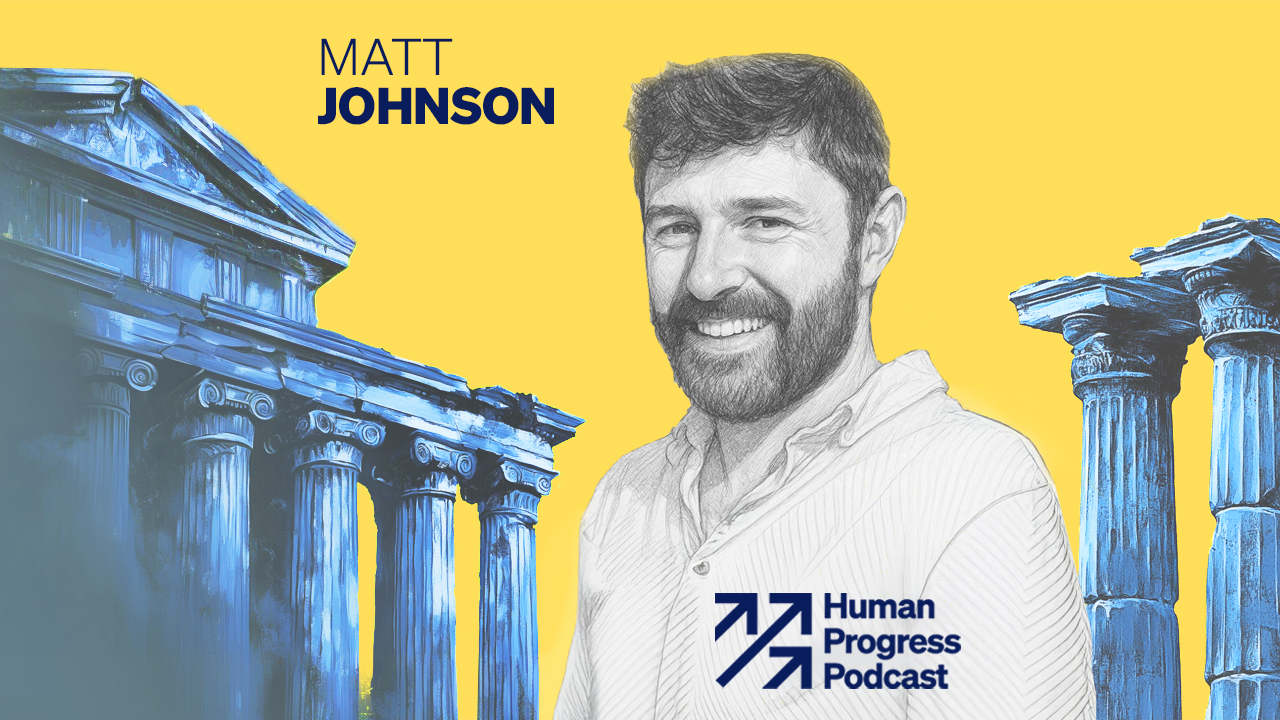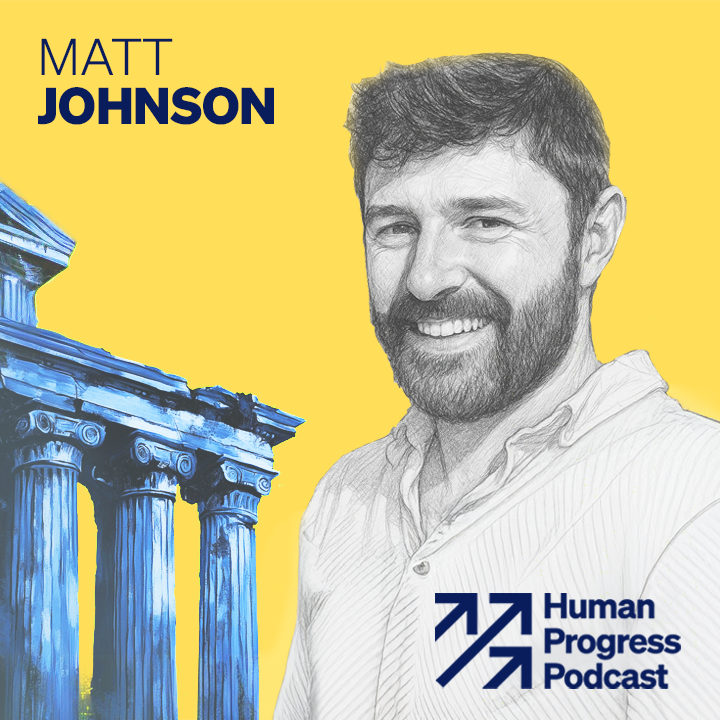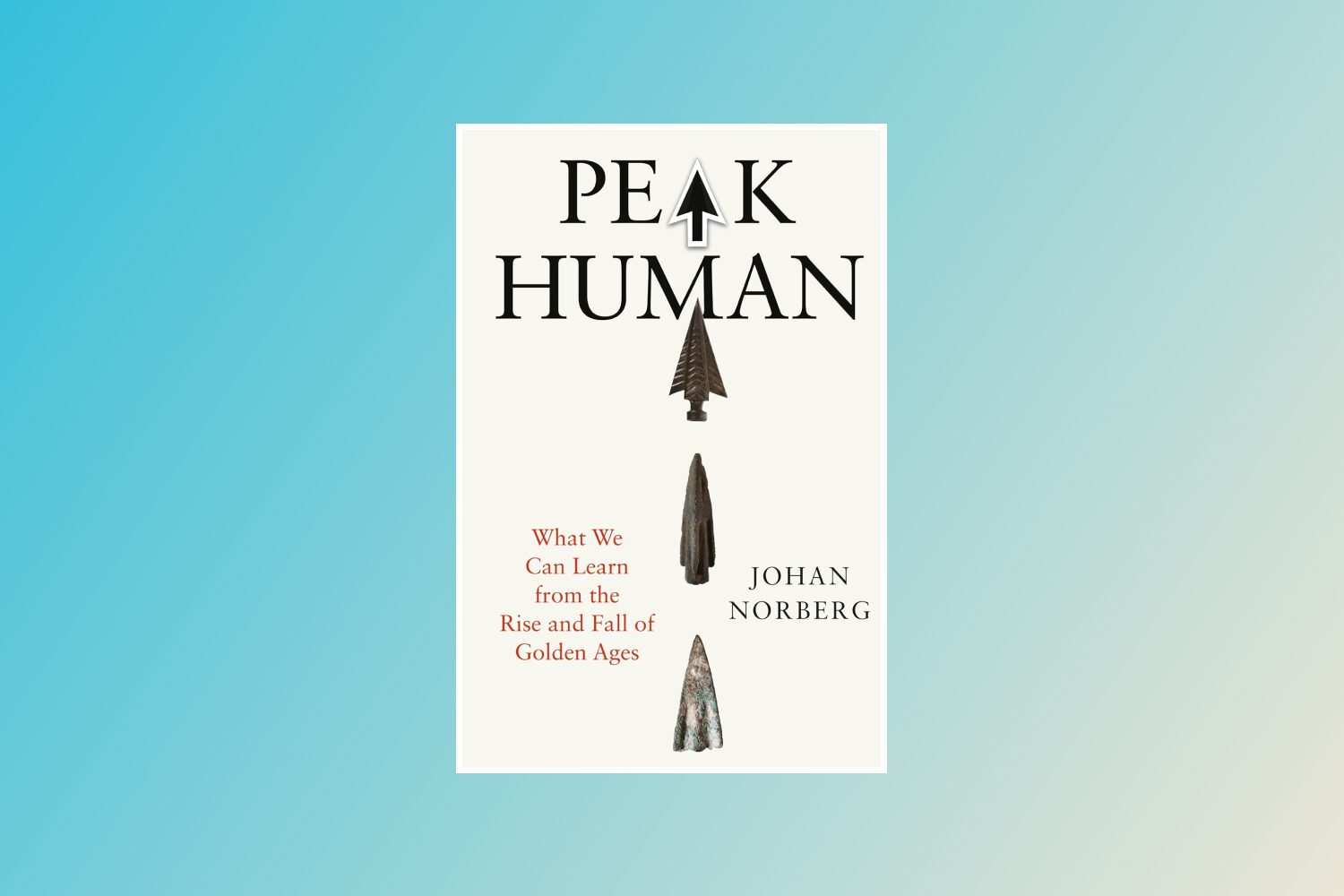Listen to the podcast or read the full transcript here.
Today, I’m very lucky to speak to Matt Johnson, who recently had a fascinating essay in Quillette titled “The Open Society and Its New Enemies: What Karl Popper’s classic can teach us about the threats facing democracies today.”
So Matt, could you tell us who Karl Popper was and what this big book is about?
Popper is mainly known for his scientific work, especially his ideas around falsifiability. He published a book called The Open Society and Its Enemies in 1945. He started writing it right after the Nazi annexation of Austria. It’s a very powerful and clarifying set of principles for anybody interested in liberal democracy and the broader project of building open societies around the world today.
So, why talk about liberal democracies and openness? It is our conjecture here at Human Progress that openness is very important. Have you ever thought or written about the connection between openness, liberal democracy, and the scope and speed of human progress?
That’s been a major theme of my work for a long time. I think there is a strong connection between the development of liberal democracy and open societies throughout the 20th century and human progress. Liberal democracy, unlike its authoritarian rivals, has error correction mechanisms built in. It allows for pluralism in society. It allows people to cooperate without the threat of violence or coercion. There’s also the economic element: Liberal democracy facilitates free trade and open exchange because it’s rule-based and law-bound, which are important conditions for economic development.
Human Progress also assumes that there is some directionality in history. We can say that living in 2025 is better than living in 1025 or 25 AD. But you begin your essay by raising the dangers of what Karl Popper called historicism, or a belief in the inevitability of certain political or economic outcomes. Can you unwind that for us? What is the difference between acknowledging the directionality of human history and historicism?
Popper regarded historicism as extremely dangerous because it treats human beings as a means to an end. If you already know what you’re working toward—a glorious worker state or some other utopia—then it doesn’t matter how much pain you have to inflict in the meantime. You’re not treating your citizens as ends whose rights must be protected; you’re treating them as raw material, as characters in this grand historical story.
The second concern is that historicism is anti-scientific because you can hammer any existing data into a form that fits your historicist prophecy.
Marx wrote that the unfolding of history is inevitable. In his view, leaders were just responsible for making that unavoidable transition easier. That’s the central conceit of historicism. If you take a Popperian view, you’re much more modest. You have to ground every policy in empirical reality. You have to adjust when things don’t work. You’re not just birthing a new paradigm you already know everything about. You don’t know what the future holds.
Stalin would say, anytime there was a setback, that it was all part of the same plan. It was all just globalist saboteurs attacking the Soviet Union, or it was some part of the grand historical unfolding that moving toward the dictatorship of the proletariat. There’s no sense in which new information can change the course of a government with historicist ideas.
That differs from a general idea of progress. We have a lot of economic data that suggests that people have escaped poverty at an incredible rate since the middle of the 20th century. We’ve seen democratization on a vast scale around the world. We’ve seen interstate relations become much more tranquil and peaceful over the past several decades. I mean, the idea of Germany and France fighting a war now is pretty much inconceivable to most people. That’s a huge historical victory, it’s unprecedented in the history of Western Europe.
So, there are good reasons to believe that we’ve progressed. And that’s the core difference between the observation and acknowledgment of progress and historicism, which is much less grounded in empirical reality.
Right. The way I understand human progress is backward-looking. We can say that we are richer than we were in the past. Fewer women die in childbirth. Fewer infants die. We have fewer casualties in wars, et cetera. But we don’t know where we are going.
Yeah, absolutely. There were moments during the Cold War that could have plunged us into nuclear war. It makes no sense to try to cram every idea into some existing paradigm or prophecy. All we can do is incrementally move toward a better world.
This brings us to another big name in your piece: Frank Fukuyama. Tell me how you read Fukuyama.
Fukuyama is perhaps the most misread political science writer of our time. There are countless lazy journalists who want to add intellectual heft to their article about some new crisis, and they’ll say, “well, it turns out Fukuyama was wrong. There are still bad things happening in the world.” That’s a fundamental misreading of Fukuyama’s argument. He never said that bad things would stop happening. He never said there would be an end to war, poverty, or political upheaval. His argument was that liberal capitalist democracy is the most sustainable political and economic system, that it had proven itself against the great ideological competitors in the 20th century, and that it would continue to do so in the future.
I think it’s still a live thesis, it hasn’t been proven or disproven. I suppose if the entire world collapsed into totalitarianism and remained that way, then yeah, Fukuyama was wrong. But right now, there’s still a vibrant democratic world competing against the authoritarian world, and I think that liberal democracy will continue to outperform.
You use a phrase in the essay I didn’t quite understand: “the desire for recognition.” What does it mean, and why is it important to Fukuyama?
The desire for recognition is the acknowledgment that human desires go beyond material concerns. We want to be treated as individuals with worth and agency, and we are willing to sacrifice ourselves for purely abstract goals. Liberal democracies are the only systems so far that have met the desire for recognition on a vast scale. Liberal democracies treat people as autonomous, rational ends in themselves, unlike dictatorships, which treat people as expendable, and that’s one of the reasons why liberal democracy has lasted as long as it has.
However, there’s a dark side. Because liberal democracy enables pluralism, people can believe whatever they want religiously and go down whatever political rabbit holes they want to. And, oftentimes, when you have the freedom to join these other tribes, you find yourself more committed to those tribes than to the overall society. If you’re a very serious Christian nationalist, you might want society organized along the lines of the Ten Commandments because that, in your view, is the foundation of morality. So, pluralism, which is one of the strengths of liberal democracy, also creates constant threats that liberal democracy has to navigate.
I noticed in your essay that you are not too concerned. You note that democracy is not in full retreat and that, if you look at the numbers, things are not as dire as they seem. What is the argument?
If you just read annual reports from Freedom House, you would think that we’re on our way to global authoritarianism. However, if you take a longer historical view, even just 80 years versus 20 years, the trend line is still dramatically in favor of liberal democracies. It’s still an amazing historical achievement. It’s getting rolled back, but in the grand sweep of history, it’s getting rolled back on the margins.
Still, it’s a dangerous and frightening trend. And you’re in a dangerous place when you see a country like the United States electing a president who is expressly hostile toward the exchange of power after four years. So, the threats to democracy are real, but we need to have some historical perspective.
So, we are more liberally democratic than we were 40 years ago, but something has happened in the last 15 to 20 years. Some of the trust and belief in liberal democracy has eroded.
How is that connected to the issue of recognition?
In the United States, if you look at just the past five or six years, there has been a dramatic shift toward identity politics, which is a form of the desire for recognition.
On the left, there was an explosion of wokeness, especially in 2020, where there was a lot of authoritarianism. People were shouted down for fairly anodyne comments, and editors were churned out of their roles. And on the right, there’s this sense that native-born Americans are more completely American than other people. All of these things are forms of identity politics, and they privilege one group over another and drive people away from a universal conception of citizenship. That’s one of the big reasons why people have become less committed to pluralism and the classic American idea of E pluribus unum.
Have you ever thought about why, specifically after 2012, there was this massive outpouring of wokeness and identity politics? Some people on the right suggest that this is because America has begun to lose religion, and, as a consequence, people are seeking recognition in politics.
I think it could be a consequence of the decline of religion. I’ve written a lot about what many people regard as a crisis of meaning in Western liberal democracies. I think, to some extent, that crisis is overblown. Many people don’t need to have some sort of superstructure or belief system that goes beyond humanism or their commitment to liberalism or what have you.
However, I also think that we’re inclined toward religious belief. We search for things to worship. People don’t really want to create their own belief systems; they would rather go out there and pick a structure off the shelf. For some, it’s Catholicism or Protestantism, and for others, it’s Wokeism or white identity politics. And there were elements of the woke explosion that seemed deeply religious. People talked about original sin and literally fell on their knees.
We also live in an era that has been, by historical standards, extremely peaceful and prosperous, and I think Fukuyama is right that people search for things to fight over. The more prosperous your society is, the more you’ll be incensed by minor inequalities or slights. The complaints you hear from people today would be baffling to people one hundred years ago.
I also think the desire for recognition gets re-normed all the time. It doesn’t really matter how much your aggregate conditions have improved; when new people come into the world, they have a set of expectations based on their surroundings. And it’s a well-established psychological principle that people are less concerned about their absolute level of well-being than their well-being relative to their neighbors. If you see your neighbor has a bigger house or bigger boat, you feel like you’ve been cheated. And this is also the language that Donald Trump uses. It’s very zero-sum, and he traffics in this idea that everything is horrible.
You raised a subject that I’m very interested in, which is the crisis of meaning. I don’t know what to make of it. Everybody, including people I admire and respect, seems to think there is a crisis of meaning, but I don’t know what that means.
Is there more of a crisis of meaning today than there was 100 years ago or even 50 years ago? And what does it really mean? Have you thought about this issue?
You’re right to question where this claim comes from. How can people who claim there is a crisis of meaning see inside the minds of the people who say that they don’t need religion to live a meaningful life? There’s something extremely presumptuous there, and I’m not sure how it’s supposed to be quantified.
People say, well, look at the explosion of conspiracism and pseudoscience. And there are people who’ve become interested in astrology and things like that. But humanity has been crammed with pseudoscience and superstition for as long as we’ve been around. It’s very difficult to compare Western societies today to the way they were a few hundred years ago when people were killed for blasphemy and witchcraft.
And look at what our societies have accomplished in living memory. Look at the vast increase in material well-being, the vast improvements in life expectancy, literacy, everything you can imagine. I find all that very inspiring. I think if we start talking about democracy and capitalism in that grander historical context, then maybe we can make some inroads against the cynicism and the nihilism that have taken root.




